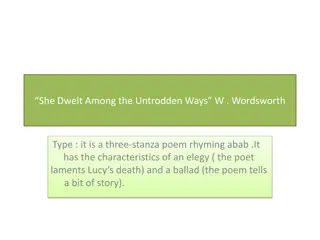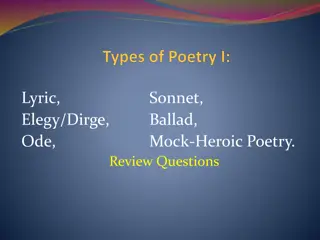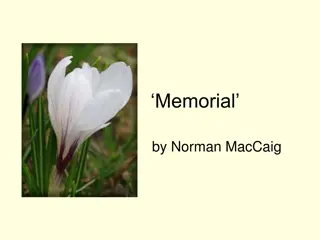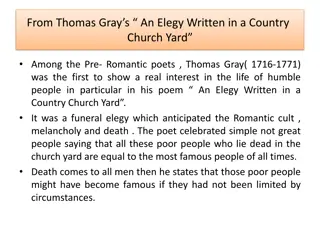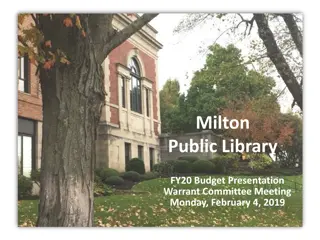An Analysis of Milton's Elegy 'Lycidas'
Dive into Milton's elegy 'Lycidas', exploring themes of death, grief, and reflections on life through pastoral imagery and literary criticism. The poem is dissected into five sections, each offering a unique perspective on the human experience and the exploration of mortality.
Download Presentation

Please find below an Image/Link to download the presentation.
The content on the website is provided AS IS for your information and personal use only. It may not be sold, licensed, or shared on other websites without obtaining consent from the author.If you encounter any issues during the download, it is possible that the publisher has removed the file from their server.
You are allowed to download the files provided on this website for personal or commercial use, subject to the condition that they are used lawfully. All files are the property of their respective owners.
The content on the website is provided AS IS for your information and personal use only. It may not be sold, licensed, or shared on other websites without obtaining consent from the author.
E N D
Presentation Transcript
welcome K.DEEPA ASSISTANT PROFESSOR OF ENGLISH BON SECOURS COLLEGE FOR WOMEN THANJAVUR.
INTRODUCTION - LYCIDAS Milton's elegy 'Lycidas' is also known as monody which is in the form of a pastoral elegy written in 1637 to lament the accidental death, by drowning of Milton s friend Edward King who was a promising young man of great intelligence. The elegy takes its name from the subject matter, not its form. No rules are laid down for the meter. The theme of the elegy is mournful or sadly reflective. It is usually a lamentation of the dead. Besides some somber themes, such as unrequited love, or a great national disaster can as well be the elegiac theme. Though lyrical, it is not spontaneous, and is often the result of deliberate poetic art, and can be as elaborate in style as the ode. We read the elegy as a conscious work of art, and not as a spontaneous expression of sorrow. Any elaborate and conscious mode of utterance might cause us to question the sincerity of the poet s emotion. Dr. Johnson, criticizing 'Lycidas' remarks, where there is leisure for fiction, there is little grief. Neither is elegy a mere expression of a sense of loss. The elegiac poet engages himself in discursive reflections. Death, the primary theme of most elegies, is a vast evocative theme. It leads the poet to regions of reflections usually lying beyond the lyric imagination. Death can be, and is often, the starting point for the poet to deal with serious themes.
FIVE - SECTIONS OF LYCIDAS Milton, for example, gives us in 'Lycidas', speculations on the nature of death, tributes to friends, as also literary criticism. He comments on the degradation of poetry and religion in 'Lycidas'. And Lycidas would be a poor poem without its passage on fame, and the onslaught on the corrupt clergy of that day. Though grief is the dominant condition in the early parts of an elegy, many elegies end on a note of joyful resignation, and also on a note of affirmation. The pastoral elegy uses the mechanism of pastoral convention-shepherds and shepherdesses, incidents form bucolic life, and rustic speech. Originally developed among the Sicilian Greeks, it was later developed by Virgil and introduced into England during the Renaissance. The poem 'Lycidas' can be conveniently divided into six sections (1) a prologue, four main parts, and an epilogue. In the prologue (lines 1-24) Milton invokes the Muse and explains the reasons for writing the poem. Although Milton had decided not to write poetry till his powers matured, bitter constraint and sad occasion compels the poet to attempt an elegy. That occasion is the untimely death of Lycidas. In the Second Section (lines, 25-84) he describes the type of life Lycidas and the poet had at Cambridge. The descriptions are in pastoral imagery. They together- Lycidas and Milton - began their study early in the morning, continued throughout the day late into the night. Besides, there were innocent recreations. But now that Lycidas was dead; a great change, heavy change had taken place. Milton laments the death of Lycidas in the manner of traditional elegiac poets. He asks the Muse where she had been when her Lycidas was dying, and adds that even her presence would not have saved him. This leads to reflections on the nature and meaning of life and death, and of fate and fame. Why should one, abandoning all pleasures, live a life of strenuous discipline, and cultivate the Muse? Fame (the last infirmity of the noble mind) is the reward of living laborious days. But as one is about to obtain his reward of fame, then fate intervenes and he dies. In the precariousness of human life lies the tragic irony. But Milton rejects pure earthy reputations as the true reward of life; that reward is in the divine judgment. At the beginning of the third section (which contains lines 85-131) Milton returns to the pastoral style, and describes a procession of mourners lamenting Lycidas s death. The procession is led by Triton, the herald of the Sea, and the last to come is St. Peter The Pilot of the Galilean lake. Through the mouth of St. Peter, Milton gives us a burning denunciation of contemporary clergy, and the sad condition of the Protestant Church in England. In these lines, we have powerful expressions of some of Milton s passionate convictions. The fourth section (lines 132-164), in which the poet describes the flowerets of a thousand hues cast on the hearts of Lycidas, is an escape from intolerable reality into a lovely world of make-believe. In the fifth section (lines 164-184) Milton expresses his belief in immortality. Grief and sorrow are temporary. And though Lycidas is apparently dead, he has arisen from the dead: Through the dear might of Him that walked the waves. Lycidas is in heaven, and therefore Weep ye no more. The saints there to entertain him in sweet societies / That sing, and singing in their glory move. The epilogue (lines 185-193) brings us back to the portal images again, and refers indirectly to the Greek Pastoral poets. The conclusion points to a new determination both to face life hopefully, and to rise up to greater poetic achievements. Thus though 'Lycidas' is a conventional pastoral elegy, which has its origin in the loss of a friend, the poem becomes impersonal and timeless. The elegiac mourning is twice interrupted to invest the personal sorrow with universal significance. This is achieved by making the tragic death of Lycidas as one example of the precariousness of existence, and the tragic irony of fate which renders all human effort futile. A second theme of equally great concern is the degeneration of the Church, and the contemporary neglect of the things of the spirit. 'Lycidas' is undoubtedly one of the greatest short poems in English language.
Going through this poem line-by-line. Lines 1-5 Yet once more, O ye laurels, and once more, Ye myrtles brown, with ivy never sere, I come to pluck your berries harsh and crude, And with forced fingers rude Shatter your leaves before the mellowing year. Laurels? Myrtles? Say what now? The speaker of "Lycidas" opens his lengthy poem by talking to some flowers. Yep, flowers. He tells them he is again coming to pick their berries and trim their leaves. The laurel is a small evergreen tree, and it's one of those plants that means something in literature. In fact, it's associated with poetry, and with a god named Apollo, who was often depicted wearing a laurel wreath on his head. Why? Well, it's all goes back to the story of Apollo and Daphne, so make sure you brush up on your Ancient romances. A myrtle is yet another kind of tree. "Sere" means "dry" or "withered," so we're thinking it's probably evergreen, too, if the myrtles are "never sere." Oh, and "rude" doesn't mean impolite here, but rather "harsh" or "violent." And "mellowing" doesn't mean calming down; it means "maturing." So the speaker is violently picking the flowers and berries off these trees before they have ripened; in other words, too early. Okay, now that we have that out of the way, let's take a closer look at these lines: First things first: our speaker doesn't seem too happy, now does he? What is his big beef with these trees? They never did anything to hurt him. And speaking of those trees, what's with all the natural imagery going on here? Let's talk rhyme. Did you notice any? We've got the pairing of "sere" and "year," plus "crude" and "rude." We might have a rhyming pattern going on, but we'll have to read more of the poem to see if we can figure it out. And while we're on the subject of form, we'll go ahead and mention that each of these lines (except for line 3) appears to be in a little something we like to call iambic pentameter. For more on this, check out our "Form and Meter" section. Finally, it's also worth noting that the speaker is using a little something we like to call apostrophe here. No, we're not talking punctuation. We're talking about the fact that our speaker is speaking to objects that can't speak back trees.
Lines 6-9 Bitter constraint, and sad occasion dear, Compels me to disturb your season due; For Lycidas is dead, dead ere his prime, Young Lycidas, and hath not left his peer. Oh, now we get it. Our speaker's beef with trees is all because of some "sad occasion." Although, now that Shmoop thinks about it, that doesn't tell us much, because we still have no idea what this sad occasion is. Patience, dear Shmoopers. Line 8 tells us that the "sad occasion" is the death of some guy named Lycidas before ("ere") his "prime" or peak, and that's what is compelling him to pick the berries before their time. Wait a minute, why would a death be a "dear" occasion? Well, because "dear" in this instance means "hard," "grievous," or "burdensome." So the occasion is sad, and also really tough. Sounds about right. "Peer" means something similar to what it means nowadays, as in a fellow or equal. According to these lines, Lycidas has died, and he hasn't left us with anybody as good as he was. Awesome. We totally get it, right? This guy Lycidas has died before his time and that is what's making the speaker pick the berries before they're ripe, right? Hold your horses. Does that even make sense? Well, it sort of does in an elaborately poetic kind of way. He is picking the berries before their prime because Lycidas died before his; it's a metaphor for the death of a young man "ere his prime." Of course we know by now (thanks to our handy "In a Nutshell" section) that Lycidas is a stand-in for Milton's dear friend Edward King, who was also a poet, and who also died before his time; the poor guy drowned at sea. Make sure you keep these tidbits in mind as you read through the rest of the poem. One more thing before we move on to the next few lines: rhyme. Yep, we've still got some of that going on with "dear" and "peer." Plus, "due" sounds a bit like "rude" and "crude" from the first couple lines. We call an almost rhyme like this slant rhyme.
Lines 10-11 Who would not sing for Lycidas? He knew Himself to sing, and build the lofty rhyme. Abandoning the trees for now, the speaker asks us a rhetorical question, as if to say, how could he not write a poem for Lycidas? After all, Lycidas was also a poet, and a pretty good one at that (he built "the lofty rhyme"). Singing in English verse is often synonymous with poetry (remember Apollo?), so the speaker is essentially saying that it is impossible not to write a poem about Lycidas, who wasn't just a poet, but one who wrote in a lofty style. And of course, we've got some rhyme going on here, too. "Knew" rhymes with the "due" at the end of line 7, and "rhyme" takes us back to "prime" in line 8. We're having a tough time spotting an actual pattern or rhyme scheme, though. While there is definitely rhyme going on, it doesn't seem to be following any rules we know about.
Lines 12-14 He must not float upon his watery bier Unwept, and welter to the parching wind, Without the meed of some melodious tear. First, we're going to go ahead and give you the scoop on some of these more obscure words, then we can tackle the meaning of these lines: "bier" is another word for tomb; "welter" is being used as a verb, here, and it means tossed or tumbled; "meed" means a fitting reward or accompaniment. Phew. Now that we have that out of the way, we can get down to business. According to our speaker, Lycidas must be mourned with the fitting reward of the tears of his friends. And we're not just talking about the saltwater that gushes out of our eyes when we're sad. We're talking poetry, or "some melodious tear." Basically, Lycidas should not remain "unwept" or unmourned while floating in the ocean (his "watery" tomb), where he might get tossed around by the wind. Of course the ocean is not actually a tomb, so we might consider Milton's use of the word "bier" as a metaphor. Add to that the metaphor of the "melodious tear," which represents poetry, and we've got some major comparing going on.
Lines 15-17 Begin then, Sisters of the sacred well, That from beneath the seat of Jove doth spring, Begin, and somewhat loudly sweep the string. Sisters? No, not these sisters. Here, our speaker is calling on the Nine muses, who were Ancient mythical women thought to inspire poetry. As it turns out, the ancient Greek word mousa means "poem" or "song" as well as muse. This "sacred well" to which these sisters belong refers to either Aganippe or Hippocrene, two springs that, in Greek mythology, were thought to be the dwelling places of the muses on Mount Helicon. Here, the speaker is asking the muses for help in writing his poem for his friend Lycidas. He needs some inspiration, pronto, so he is hoping the muses will "sweep the string," which is a poetic way of saying, "play music." This appeal to the muses (called the invocation) is a frequent feature of western poetry, from Homer through the 19th century. No one likes writer's block. In these lines, the poet strays squarely into the world of myth. Our speaker is asking the muses for help, which means we're in a world of imagination and inspiration. We have left the poet's Cambridge home behind.
Lines 18-22 Hence with denial vain, and coy excuse, So may some gentle Muse With lucky words favour my destined urn, And as he passes turn And bid fair peace be to my sable shroud. More muse-invoking here. Essentially, our speaker is hoping that a "gentle Muse" will help him write. Only, instead of asking for help writing a poem about his friend Lycidas, our speaker is hoping that one day, when he dies, someone will do the same for him. Let's break it down. The phrase "hence with denial vain, and coy excuse" is a tough one, that's for sure. The speaker seems to be saying something like, "All right, quit being a baby. No more denial and excuses it's time for me to get cracking on the poem." An "urn" is a vase that contains a person's ashes, but the speaker is probably just using it here as a metaphor for a grave or tomb. And a "shroud" is a sheet (usually white) in which a corpse is wrapped. A "sable shroud," however is a black one. This image gives the line a more melancholy, ominous tone. These last two lines are tricky, but our speaker seems to be saying, "Hopefully some future poet, when he passes by my grave or tomb, will say 'peace be with you' or 'rest in peace.
Lines 23-24 For we were nursed upon the selfsame hill, Fed the same flock by fountain, shade, and rill. Looks like the speaker and this Lycidas fellow were childhood friends. "Nursed upon the selfsame hill" is a poetic way of saying that the two of them grew up in the same countryside, and tended the same flock of sheep. These two were buddies from the start. By the way, a "rill" is a small stream or rivulet. Next time you're on a hike, you can impress your friends by dropping that vocab on them. Or maybe not.
Lines 25-27 Together both, ere the high lawns appeared Under the opening eye-lids of the morn, We drove a- field [ ] More of the same going on here. The speaker continues to describe his past with Lycidas, saying that they both used to get up before the sun rose to take their sheep out to the fields. "High lawns" here refers to open spaces between woods, not suburban front yards. There are no kids running through sprinklers here. Of course these lawns don't appear magically; they just seem to when the sun comes up when the "morn" opens its eyes. Everything is dark, and suddenly, when the sun comes up, a whole world appears. That's a nice thought, huh? Oh, and "drove" refers to the act of driving or moving sheep.
Lines 27-31 [ ] and both together heard What time the gray-fly winds her sultry horn, Battening our flocks with the fresh dews of night, Oft till the star that rose, at evening, bright, Toward heaven's descent had sloped his westering wheel. Word alert! There's all kinds a crazy vocab being tossed around in these lines. Lucky for you, Shmoop loves to play dictionary: a "gray-fly" probably refers to any number of insects. Just imagine your standard bug; "sultry" does not mean attractive and alluring the way it does today. Nope, it just means hot and toilsome. Remember from the last couple lines that the speaker and his best bud Lycidas would be out before the dawn shepherding their flock. Well, when that morning comes, they hear the sound of this insect, the gray-fly, which indicates the sun is up, and hot. Apparently, they spend all day out there, "battening" or fattening their flocks on the dew that has accumulated overnight, until "the star that rose, at evening, bright" starts to set, or slope "his westering wheel." This star our speaker is talking about is probably not a star at all, but the planet Venus, which many folks in the way back days called the evening star. In other words, they used to hear the "gray-fly" for quite some time (even after the evening star had risen and started to descend). What's the takeaway point here? We're glad you asked. What these lines tell us is that Lycidas and our speaker were pretty inseparable. After all, they would spend all day together (and even some of the night), tending to their flock.
Lines 32-36 Meanwhile the rural ditties were not mute, Tempered to the oaten flute; Rough Satyrs danced, and Fauns with cloven heel From the glad sound would not be absent long. And old Damoetas loved to hear our song. The speaker tells us that he and Lycidas would compose songs or poems ("ditties") to the tune of an "oaten flute" (a pipe made from the stem of an oat). Sounds like good times out on the lawn. Various mythological creatures, like satyrs and fauns danced along to their tunes; they couldn't resist, not even Damoetas. For all you pastoral poetry experts out there (anyone?), the name Damoetas just might sound familiar. It's a name often used in pastoral poetry for a shepherd, and Virgil, whose work inspired Milton, used it in his Eclogues. "Tempered" means "in harmony with" or "attuned to." "Rural ditties" might be a reference to the type of pastoral poetry found in "Lycidas." If we had any doubt before, the mention of satyrs and fauns seals the deal: we have entered into a dreamy, mythological world, one that is very different from Milton's real England.
Lines 37-38 But O! the heavy change now thou art gone, Now thou art gone and never must return! All right, pal, the time for daydreaming is over. He has undergone a "heavy change" because Lycidas has passed away. No more frolicking on the lawn, no more boogieing with the satyrs. It's time to face a very different kind of music. Note the repetition of "now thou art gone." Our speaker can't seem to get over the loss of his friend. He even tops it off with an exclamation mark. Now that's some serious business.
Lines 39-41 Thee, Shepherd, thee the woods, and desert caves, With wild thyme and the gadding vine o'ergrown, And all their echoes mourn. Another apostrophe. Here, our speaker talks to Lycidas directly. The problem is, the dude is dead, so he's not actually around to hear our speaker. In talking to Lycidas, he tells him just how much his death has affected the natural world. Even the caves (which are overgrown with "wild thyme" and "gadding vine") and the woods mourn his death. "Gadding" means "wandering" or "roving." You may have noticed that the structure of these lines is a wee bit tricky. The verb ("mourn") comes in the last line, but its object ("thee," referring to the shepherd Lycidas) is in the first. In between the object and its verb comes the description of the caves ("o'ergrown" with "wild thyme" etc.). These lines are also an example of personification. The speaker is giving non-human things, like caves and woods, human qualities in this case, emotions.
Lines 42-44 The willows, and the hazel copses green, Shall now no more be seen Fanning their joyous leaves to thy soft lays. It's not just the caves and woods that are bummed out about Lycidas' death. The willows and the hazel trees are down in the dumps, too. How do we know those trees are sad? Well, they aren't shaking their tail feathers oops, we mean "leaves" to the rhythms of Lycidas' righteous tunes, or "lays." A "lay" is a short poem or narrative meant to be sung; usually, it is a synonym for poetry.
Lines 45-49 As killing as the canker to the rose, Or taint-worm to the weanling herds that graze, Or frost to flowers, that their gay wardrobe wear, When first the white-thorn blows; Such, Lycidas, thy loss to shepherd's ear. Yikes. We've got a very complex sentence here. Basically, we can think of these lines as a bunch of similes strung together. Something is "as killing as the canker to the rose." A canker is a disease that infests rose plants. Uh oh. That same something is like a "taint-worm to the weanling herds." A "taint-worm" is an intestinal worm that kills young (or "weanling") calves. Pause for "ew"s. And finally, that same something is as deadly as frost is to blooming (as in, wearing their "gay wardrobe") flowers. What's that something? Lycidas' death. Just in case you were still in the dark: Lycidas' death was very very bad to our speaker. Very bad. This sequence of lines is a simile, except instead of saying "Lycidas' death was like " the speaker inverts the order .
Line 50-51 Where were ye, Nymphs, when the remorseless deep Closed o'er the head of your loved Lycidas? The speaker wonders where the nymphs who supposedly love Lycidas were when he drowned in the ocean, which he calls "the remorseless deep." He's addressing these nymphs directly, as though he wants to call them out. He is none too pleased with their behavior. Not cool, nymphs.
Lines 52-55 For neither were ye playing on the steep Where your old bards, the famous Druids, lie, Nor on the shaggy top of Mona high, Nor yet where Deva spreads her wizard stream. The speaker says the nymphs weren't at any of their normal hangouts when Lycidas was drowning. What are those normal hangouts? Well, they should have been on the "steep," which refers to a pinnacle or mountain. The phrase "old bards, the famous Druids, lie" tells us that this mountain just might be located on an island called Bardsey, off the north coast of Wales. In Milton's time, it was rumored that 20,000 saints were buried there. Druids were priests in the pre-Roman Celtic cultures of Ireland, Wales, England, etc. We don't know much about them, and neither did Milton, but they have become the stuff of legend. In some traditions, they were viewed as priests of Apollo, which explains why Milton relates them to the nymphs. And these nymphs weren't on the "shaggy top of Mona" either. No, he's not talking about a bad haircut on a girl. In this case, Mona probably refers to the Isle of Anglesey, an island off the northwest coast of Wales. It was thought to have been inhabited by druids at one point, too. Lastly, the nymphs weren't near the Deva, either. Deva refers to the Dee, a river that runs through Wales and England, and partly marks the border between them. "Wizard" here means enchanted or magical. Sounds like quite the river.
Lines 56-57 Ay me, I fondly dream! Had ye been there, for what could that have done? This speaker has a habit of being lost in daydreams, only to shake himself out of them when he remembers the cruel fact of Lycidas' death. His use of the exclamation shocks us out of our reverie, too. After calling out the nymphs for not being where a jolly old Englishman might usually find them, the speaker realizes he shouldn't blame the nymphs; that's just fantasizing ("I fondly dream"). He seems to think that they wouldn't have been able to do anything even if they had been there, a point he makes by asking another rhetorical question.
Lines 58-63 What could the Muse herself that Orpheus bore, The Muse herself for her enchanting son, Whom universal nature did lament, When, by the rout that made the hideous roar, His gory visage down the stream was sent, Down the swift Hebrus to the Lesbian shore? As evidence that the nymphs couldn't have prevented Lycidas' death, the speaker alludes to the story of Orpheus, a poet in Greek mythology whose mother (the Muse Calliope) wasn't able to save him from being dismembered and washed downstream by the "rout that made the hideous roar." These lines are tough, but here's a way you might paraphrase them: "what could the muse that mothered Orpheus, [what could] the muse herself [do] for her son whom nature mourned, when his head was sent down the river Hebrus by a group of hooligans who had it out for him?" Who were those hooligans? Well, it might help to know some background on this Orpheus dude. For more info, check out Shmoop's page on Orpheus and Eurydice. Hebrus is the Ancient Greek name for a river that runs through modern-day Bulgaria, Greece, and Turkey. And "Lesbian shore" refers to the island of Lesbos, off the coast of Greece. That's a pretty long, complicated allusion. But really, all the speaker is saying here is that if even Calliope couldn't save her own son, why should he expect the Muses to have saved Lycidas? Maybe he should cut them some slack
Lines 64-66 Alas! what boots it with uncessant care To tend the homely slighted shepherd's trade, And strictly meditate the thankless Muse We've got another exclamation to open these lines. Our speaker is all kinds of unhappy. Shmooptionary to the rescue: "Boots" here is a verb, meaning something like to profit, or to gain. And "uncessant" is just an older spelling of incessant, or without stopping. Essentially, in these lines, the speaker is wondering what he would gain by continuing to live like a shepherd (without good old Lycidas by his side), and dwelling, or "strictly meditat[ing]" on the fact that the Muse does not seem interested in helping him out (in other words, she is "thankless"). We can't help but thinking that he probably doesn't have much to gain at all, the poor guy. You know what's interesting here? Earlier, when the speaker was describing the shepherd's life, it sounded pretty awesome, right? He and Lycidas frolicked with the fauns and salsaed with the satyrs. But now that life seems not-so-great; in fact, it's "homely" and "slighted" (or ugly, and ignored). What's the point anymore?
Lines 67-69 Were it not better done as others use, To sport with Amaryllis in the shade, Or with the tangles of Neaera's hair? In other words: Wouldn't it be better to "sport with Amaryllis" and the "tangles of Neaera's hair" like everyone else ("better done as others use") than think about the muse and live the difficult life of a shepherd? Okay, now we understand the question, but do we actually know what he's asking? It might help to get a little background: Amaryllis is a shepherdess who appears in the work of several ancient pastoral poets, most notably Virgil (in the Eclogues) and Theocritus (in the Idylls). Neaera is another nymph who pops up in pastoral poetry; she appears in Virgil's Eclogues and the work of several later poets. The "tangles" of her hair are always mentioned. May we recommend conditioner? Here, the speaker builds on the idea he introduced in the previous lines: He might have a better time of it if he ditched the shepherd life and took up with some nymphs. Maybe then he could get over the loss of his buddy.
Lines 70-72 Fame is the spur that the clear spirit doth raise (That last infirmity of noble mind) To scorn delights, and live laborious days; For the past few lines, the speaker has been asking the age-old question: Why bother? Now, he gives us the answer. The speaker is saying that the only we reason we "scorn delights" (like hanging out with Amaryllis and Neaera) and live a life of labor is because the prospect of fame "spur[s]" us on. Milton has always been a fan of strange syntax, and these lines are no exception. When you read "Fame is the spur that the clear spirit doth raise," it sounds like the clear spirit is raising the spur of fame, right? Wrong. It actually means that the spur of fame raises the clear spirit. Funky, huh? Basically, he is using a metaphor to say that fame prods the spirit to action, much like a spur prods a horse to move. Awesome. We have that part down. Now what's this "last infirmity of noble mind" all about? Well, that phrase modifies fame, which means that fame is something that makes a noble mind sick. If you think about it, that makes perfect sense. If noble people get caught up in trying to be famous, they probably will ignore fun things and focus too hard on their work. Wait, but people become famous now for all kinds of "delights." And many famous people have barely done any work at all. True, but in Milton's day, you became famous through your work. Milton wanted to be a very famous poet, so he probably scorned a fair number of delights in his day, and focused only on toiling away at the pen. Again, he is continuing the idea he started a few lines ago: shepherding is no longer the fun it used to be, when Lycidas was around. Now it sounds like tough work.
Lines 73-76 But the fair guerdon when we hope to find, And think to burst out into sudden blaze, Comes the blind Fury with th' abhorred shears, And slits the thin-spun life. [ ] This fame thing is pretty fickle. In fact, it's downright elusive. The speaker continues talking about the elusiveness of fame: When we think we've finally found it, or that our time has come ("and think to burst out into sudden blaze"), Fate comes and kills us. A "guerdon" is a reward, which means that fame is presented as a reward. The problem is, just when we think we have found that guerdon, "blind Fury," or fate, comes to take it away. How does fate rob us of fame? With its "shears" that can easily cut through the flimsy, or "thin-spun" material that is human life. In other words, just when Lycidas was about to "burst out in a sudden blaze" (now there's an image) of fame, fate intervened and killed him. Tough break. This "blind Fury," by the way, is yet another classical allusion to Greek mythology. The Fates, of which this Fury in an example, were three female figures who were in charge of determining how long a person would live. The specific Fury, or Fate that our speaker is referring to here is probably Atropos, who was the one in charge of cutting the "thread" with "abhorred shears," which ended a person's life.
Lines 76-77 [ ] But not the praise, Phoebus replied, and touched my trembling ears; Enter Apollo, the Greek god of the sun, music, and poetry, among all kinds of other things (the Greek gods were major multitaskers). In these lines, he's called by his Roman name, Phoebus. Phoebus tells the speaker that while the "blind Fury" does destroy human life, she doesn't destroy all the praise we get for our achievements (especially the poetic ones, right?). He says this while touching the speaker on the ears. What's up with that, you ask? Well, it's an allusion to Virgil's Eclogues, in which the speaker's ears are touched as well. It's a form of admonishment, or scolding. Essentially, Phoebus is telling our hotheaded speaker to cool his jets.
Lines 78-80 Fame is no plant that grows on mortal soil, Nor in the glistening foil Set off to the world, nor in broad rumour lies, Phoebus describes Fame as something that cannot be found in this mortal world ("soil"), and especially not in one's reputation or "rumour." Wait. What? Essentially, Phoebus is telling our guy that fame isn't about how many people on earth know and respect you. "Foil" here refers to a piece of silver or gold placed under a precious stone to enhance its luster (presumably for display purposes). In this sense, a foil creates an illusion, the same way that looking for fame on earth does. We might think of these lines as a kind of negative metaphor. Fame is not a plant, and it's not a foil. Awesome. Wait. What is it, then?
Lines 81-84 But lives and spreads aloft by those pure eyes, And perfect witness of all-judging Jove; As he pronounces lastly on each deed, Of so much fame in heaven expect thy meed. Phoebus tells the speaker that fame actually "lives" and grows, or "spreads" aloft as a result of Jove's decisions. Jove has the final word, as he "pronounces lastly on each deed." Here, fame is metaphorically compared to a tree or plant that grows in heaven, provided Jove allows it to, of course. Remember the word "meed" from line 14? Here it means about the same thing: a fitting reward. The idea here is that Jove will give us however much fame in heaven we deserve.
Lines 88-92 But now my oat proceeds, And listens to the herald of the sea That came in Neptune's plea, He asked the waves, and asked the felon winds, What hard mishap hath doomed this gentle swain? Oat? Is he talking about a piece of grain with ears, toddling along, listening to the ocean? We wish. No, he's talking about his song, the pastoral poem he's writing. "Oat" is a stand-in for a musical instrument made out of an oat-stalk, like the "oaten reed" he mentioned way back in line 33. When he says "my oat proceeds," the speaker means he is continuing his song. He describes how Triton, the "herald of the sea," comes to defend ("came in [ ] plea") Neptune, who is the god of the sea, from the charge of Lycidas' death. Milton's friend Mr. King drowned in the ocean, so it makes sense that our speaker might blame the god of the sea for his friend's death. But Triton isn't having it. In fact, Triton wants to understand what went down, too. So he asks the waves and the savage (or "felon") winds what happened to Lycidas, the "gentle swain." Sure Triton, just blame it on the weather, why don't you?
Lines 93-99 And questioned every gust of rugged wings That blows from off each beaked promontory: They knew not of his story, And sage Hippotades their answer brings, That not a blast was from his dungeon strayed; The air was calm, and on the level brine Sleek Panope with all her sisters played. This Triton dude is all about getting some answers. He also asked the "wings" blowing from pointed ("beaked") promontories (a piece of land jutting out into the sea), and they didn't know anything about Lycidas' story. These wings might be a synecdoche for birds, flying from sea-cliffs, or perhaps it's just referring to the wind. Who is this Hippotades guy? Well, that's just another name for Aelous, the god of the winds. He kept the winds stored in a cave ("dungeon") and tells the speaker that all of his winds were at home when Lycidas died, so they couldn't have had anything to do with the tragedy. Hippotades also says that the "air was calm," and Panope, one of fifty sea Nereids, was seen playing on the calm ("level") sea, or "brine."
Lines 100-102 It was that fatal and perfidious bark, Built in the eclipse, and rigged with curses dark, That sunk so low that sacred head of thine. "Perfidious bark"? Is there a dog around? Perfidious means deceitful, or untrustworthy, and bark is another word for ship. Here, our speaker is saying that the ship is to blame for Lycidas' death, not the winds or the sea. The ship is what "sunk so low that sacred head of thine." In other words, "The ship is what drowned you, Lycidas." Eclipses were once considered evil omens, and the speaker implies that because the ship was built during one it was "rigged with curses dark," which caused Lycidas' death. Let that be a lesson, all you shipbuilders out there.
Lines 103-107 Next Camus, reverend sire, went footing slow, His mantle hairy, and his bonnet sedge, Inwrought with figures dim, and on the edge Like to that sanguine flower inscribed with woe. "Ah! Who hath reft" (quoth he) my dearest pledge?" Camus appears, another word for the river Cam (which runs near Cambridge University, the home of Milton and King). The speaker personifies the river by saying that it is clearly mourning for Lycidas it is "inscribed with woe." He also asks who has taken ("reft") his dearest "pledge." The river wants to know who has taken Lycidas. The speaker goes even further with his personification, describing Camus as a university student, complete with a furry academic gown ("mantle hairy") and wearing a "bonnet sedge." A "sedge" is a rush-like plant that grows near water. The bonnet is compared to the "sanguine flower," the hyacinth. In Greek mythology, a Spartan youth named Hyacinthus was accidentally killed while playing with Apollo, god of the sun, music, and poetry. According to one myth, hyacinth flowers sprung up from his blood that was spilled. Supposedly, the flower was marked with the Greek word "AI," which translates to "alas," which is a pretty woeful word, if we may say so.
Lines 108-112 Last came, and last did go, The Pilot of the Galilean lake. Two massy keys he bore of metals twain, (The golden opes, the iron shuts amain) He shook his mitred locks, and stern bespake "The Pilot of the Galilean lake" refers to none other than Saint Peter, one of Jesus' star disciples. In these lines, he appears (the last of all the figures that have appeared before our speaker) with two keys made of two different kinds of metal and begins to speak. The golden key opens the gates (presumably to heaven) while the iron one shuts them quickly, or "amain." This is a reference to the fact that Saint Peter was the guy in charge upstairs; according to the Bible, he held the keys to the kingdom of heaven (Matthew 16:17- 20). A miter, by the way, is a type of headdress or cap worn by certain religious figures. To have "mitred locks" means that Peter's hair is stuffed up underneath a miter, which makes sense when you consider that, according to the Catholic Church, Saint Peter was the first pope. Here's something that jumped out to Shmoop: in these lines, the speaker makes a biblical allusion, rather than a classical one. It marks a shift in the poem from pagan references to Christian ones. Why do you think our speaker makes this change?
Lines 113-115 "How well could I have spared for thee, young swain, Enow of such as for their bellies' sake Creep, and intrude, and climb into the fold! He speaks! In these lines, Peter begins a speech that is confusing, to say the least. He seems to be saying to the speaker, "How well could I have saved for you, young shepherd. Enough of those guys who break into the fold only to eat ("for their bellies' sake")." In other words, Peter is not a fan of self-interested people, who find fame and belonging only for the sake of material gain. Peter could have reserved one of those guys for the speaker to sing about, but he didn't. Based on Milton's note at the beginning of the poem, which claims that the poem will also "foretell the ruin of our corrupted clergy," it is clear that the bad shepherds St. Peter goes on to detail refer to bad religious leaders who don't care about their "flocks," and care more about fattening their bellies.
Lines 116-118 Of other care they little reckoning make Than how to scramble at the shearers' feast, And shove away the worthy bidden guest St. Peter goes into more detail about these good-for-nothing shepherds. These dudes don't care about anything else ("of other care they little reckoning make") but scrambling for food at the feast and forcing out those who were actually invited ("shove away the worthy bidden guest"). He's reinforcing the idea, introduced in Line 65, that shepherding just ain't what it used to be back when Lycidas was around.
Lines 119-121 Blind mouths! that scarce themselves know how to hold A sheep-hook, or have learned aught else the least That to the faithful herdsman's art belongs! These guys not only come where they aren't wanted, but they don't even know how to hold a "sheep-hook" or do anything else that a shepherd should know how to do ("aught else the least / That to the faithful herdsman's art belongs"). Shepherd posers. Not cool. The "blind mouths" might refer to the fact that they eat without looking or are somehow blindly led by the desire to feed their mouths. Basically, the takeaway point is that the shepherding profession is being overrun by bad dudes. Peter is not happy, and neither, we imagine, is our speaker .
Lines 122-124 What recks it them? What need they? They are sped; And when they list, their lean and flashy songs Grate on their scrannel pipes of wretched straw; These bad shepherds don't even care about their inabilities as shepherds because they have what they want and are perfectly satisfied, or "sped." When they choose, "list," they sing weak, bad, and "flashy" songs. These songs sound terrible and grating when they play them on their squeaky, or "scrannel" pipes. "What recks it them" means "what business is it of theirs?" Peter is referring to line 121, in which he talks about the "faithful herdsman's art." He is saying, why should these no-good shepherds even bother caring about the fine art of sheep herding, when they are perfectly happy being not-so-good at it.
Lines 125-127 The hungry sheep look up, and are not fed, But swoll'n with wind, and the rank mist they draw, Rot inwardly, and foul contagion spread; St. Peter isn't finished, folks. He still has a bone or two to pick. According to him, the sheep look to their inadequate shepherds because they're hungry; they are full ("swollen") with wind and mist, but not tasty food like, you know, grass. As a result, they're slowly wasting away and spreading diseases, or "contagion." Note the word choices here: "rank," "rot," and "foul." These words, in combination with the fact that we have Saint Peter, who literally holds the keys to Christian heaven saying them, hint at the corruption in the clergy that Milton alludes to in the preface to his poem.
Lines 128-131 Besides what the grim wolf with privy paw Daily devours apace, and nothing said; But that two-handed engine at the door Stands ready to smite once, and smite no more." All this lousy shepherding going on is even worse when you add to it the fact that the sheep are already being attacked by wolves on a daily basis. Of course these lame shepherds don't even say anything about it. Peter also says that some "two-handed engine" is ready to "smite" or cut down these bad shepherds for good. Once this "engine" smites them, he will "smite no more," because the job is done. "Privy" means "clandestine," "secret," or "stealthy." Some critics think that the "wolf" is a reference to the Roman Catholic Church, which Milton, a radical Protestant, hated. Yep, hated. Nobody really knows what that "two-handed engine" is, and there are about as many speculations as there are lines in the poem. Some think that it refers to the sword in the book of Revelations, which represents the word of God. But it could also be a reference to just about any other sword that appears in the Bible and there are a fair few, friends. Whatever that sword represents, it's ready to do some damage. We might think of this as Milton assuring his readers that the unworthy members of the clergy in England will pay the price for their corruption eventually. And his 1645 preface reminds us that they totally did.
Lines 132-135 Return, Alpheus, the dread voice is past That shrunk thy streams; return, Sicilian Muse, And call the vales, and bid them hither cast Their bells and flow'rets of a thousand hues. Now that Peter has finally run out of steam, the speaker pipes up again. He tells Alpheus to come back now that St. Peter's speech is over, or his "dread voice is past." We guess Peter's little lecture had driven Alpheus off for a while. Because he is a river god, the speaker tells us that Alpheus had peaced out by saying he had "shrunk [his] streams." Oh, and you might find it interesting that Alpheus is often associated with Arethuse, a river the speaker mentions in lines 85-6. The speaker also appeals to the "Sicilian Muse" and asks her to tell the winds ("vales") to send flowers in all kinds of colors. Because the founder of pastoral poetry was a Greek poet from Sicily named Theocritus, invoking the "Sicilian Muse" means he is invoking the muse that inspired some of the world's very first pastoral poems those of Theocritus. Alpheus refers to a river and god that is often associated with Arethuse (see lines 85-6 where the speaker talks about this river). In one story, Alpheus fell in love with the nymph Arethuse. He pursued her, but Diana (a.k.a. Artemis, goddess of the hunt and virginity) turned her into a stream before he could catch her. The stream mingled with Alpheus, went underground, and re-emerged in Sicily. We might think of this as the speaker addressing Alpheus as a stand-in for pastoral poetry, as if the poet were saying, "come back, my pastoral themes. How I've missed you."
Lines 136-141 Ye valleys low, where the mild whispers use, Of shades, and wanton winds, and gushing brooks, On whose fresh lap the swart star sparely looks, Throw hither all your quaint enamelled eyes, That on the green turf suck the honied showers, And purple all the ground with vernal flowers. Our speaker must be a huge fan of addressing nonliving things, because we've got another apostrophe here. In these lines, he addresses valleys with beautiful shades, winds, and brooks. He tells them to cast their eyes ("throw hither all your quaint enamelled eyes") where he is looking. Awesome. But wait, where's our guy looking? Perhaps toward Lycidas? "Whispers" refers to a soft, rustling sound, almost like the sound of you guessed it whispering voices. "Use" here means "go frequently" or "haunt." The speaker is referring to valleys in which there are often "whispers." Now that we have the first couple lines down, let's tackle the more confusing later lines. What's a "fresh lap" and a "swart star," you ask? Well, the word lap can refer to a hollow, or a place between hills, kind of like you guessed it a valley. The "swart star" is Sirius, the dog star. According to Homer, Sirius was the canine companion of Orion, a hunter in Greek mythology. When Zeus made Orion into a constellation, he let Sirius join his human master in the stars. Now, Sirius the star is associated with extreme heat and sometimes a lack of fertility.
Lines 136-141 The word "swart" means dark in appearance, which is a bit of a strange description when you consider that Sirius is the brightest star in the sky. But maybe our speaker is alluding to the fact that the dog star looks on "sparely," which means it doesn't look on very much. In other words, the valley is so fertile the dog star doesn't affect it very much. The speaker is asking these valleys to toss around their "quaint enamelled eyes," which means he wants these valleys to spread their beautiful, many-colored eyes, or flowers. These flowers of the valley "suck" the sweet rainwater, or "honeyed showers," from the "green turf" and make the ground look purple with spring flowers. What's interesting here is that way back at the beginning of the poem, the speaker did not seem at all interested in having things bloom. Remember, he wanted to pluck all the berries and leaves from the trees before they had a chance to bloom and ripen? But now he's all about flowering. He wants the world to bloom a lot.
Lines 142-148 Bring the rathe primrose that forsaken dies, The tufted crow-toe, and pale jessamine, The white pink, and the pansy freaked with jet, The glowing violet, The musk-rose, and the well-attired woodbine, With cowslips wan that hang the pensive head, And every flower that sad embroidery wears: Let's dig a little deeper into this flower imagery, shall we? The speaker goes into more detail about these "enamelled eyes." He tells the valleys to bring the "rathe," or ripening, primrose, the wild hyacinth (which he calls a "tufted crow-toe"), jasmine, and the pink and the pansy (which we can just think of as generic flowers). That sounds nice and all, but these blooms are "freaked with jet," which means they are streaked with black, which is a sign of mourning. He also tells them to bring the violet, the woodbine, and pale ("wan") cowslips that seem to be hanging their heads. Basically, he is saying bring every flower that seems to look sad the ones that wear "sad embroidery." It seems like he's okay with blooming, as long as that blooming doesn't involve happy flowers. If the flowers look sad, that's fine by him.
Lines 149-151 Bid Amaranthus all his beauty shed, And daffadillies fill their cups with tears, To strew the laureate hearse where Lycid lies. The speaker continues, telling the valleys to ask "amaranthus" to shed his beauty and the daffodils to shed tears. We learn that the speaker wants these flowers, and all the flowers he mentioned in his earlier lines to decorate Lycidas' coffin. (That's where the "strew the laureate hearse" part comes in. Because Lycidas was an aspiring poet, his coffin has a laurel on it.) While the amaranth is a real flower, it also refers to a mythical one that supposedly never fades or loses its beauty. It is associated with Eden, or paradise, and the fact that the speaker is asking this always beautiful flower to shed its beauty is telling, don't you think? His grief for Lycidas is so extreme that he even wants the amaranth to show it.
Lines 152-153 For so to interpose a little ease, Let our frail thoughts dally with false surmise. The speaker says that he must "dally with" (engage with or entertain) a "false surmise" in order to "interpose a little ease." What's that all about? Well, the "false surmise" refers to the act of strewing Lycidas' coffin with all those flowers, because technically there is no hearse: Lycidas' body is somewhere beneath the ocean. Still, he wants to have some sort of ceremonial grieving process to mark the occasion. Thinking about strewing Lycidas' coffin with flowers at least gives our speaker a little taste of solace.
Lines 154-164 Ay me! whilst thee the shores and sounding seas Wash far away, where'er thy bones are hurled, Whether beyond the stormy Hebrides, Where thou perhaps under the whelming tide Visit'st the bottom of the monstrous world; Or whether thou, to our moist vows denied, Sleep'st by the fable of Bellerus old, Where the great vision of the guarded mount Looks toward Namancos and Bayona's hold; Look homeward angel now, and melt with ruth. And, O ye dolphins, waft the hapless youth. In these tricky lines, the speaker elaborates on the fact that Lycidas' body is missing. This is the beginning of a long and slightly complicated sentence. Don't worry, Shmoopers, we'll break it down for you. In fact, we'll go ahead and paraphrase it: "While the seas and shores wash your body far away, wherever your bones are hurled, whether that be beyond the stormy Hebrides, where you might be underneath the ocean and visiting a realm of sea monsters; or whether, despite our tearful prayers, you're sleeping by the fable of Bellerus, from where one can see Namancos and Bayona's hold, I want you, angel, to look homewards and feel sad. And dolphins, convey Lycidas' body safely home." Phew! Even with our improvised modern English translation, there are still a few places to get tripped up. First, the Hebrides are a group of islands off the coast of Scotland. "Whelming" means engulfing, and "Moist vows" means tearful prayers. "Bellerus" is a hero that Milton invented in order to explain the word Bellerium, a Latin word meaning land's end. In other words, the speaker is saying to Lycidas, "whether you're stuck beneath the ocean or resting at land's end, please look homewards." The "great vision of the guarded mount" refers to a story about how some monks reportedly saw a vision of St. Michael on St. Michael's Mount, an island off the southwest coast of England. "Vision" also means "one's line of sight" from the top of St. Michael's Mount. So, at lands end, or St. Michael's Mount, the line of sight stretches toward Namancos and Bayona's hold. "Namancos" is an old name for a region in northwestern Spain, and "Bayona's hold" refers to an old fortress town in western Spain.
Lines 165-167 Weep no more, woeful shepherds, weep no more For Lycidas your sorrow is not dead, Sunk though he be beneath the wat'ry floor. Hmm. Shmoop senses a change afoot. Do you? Things start to turn around for the speaker here. He tells his fellow shepherds to stop weeping, because Lycidas isn't really dead, even though he has sunk into the ocean. Or at least, that's what we think he means But the line "for Lycidas your sorrow is not dead" can be read two ways. In one interpretation, "sorrow" modifies Lycidas, as in "Lycidas, the man for whom you feel sorrow, is not dead." Alternatively, the speaker could be addressing Lycidas himself, saying, "Hey Lycidas, your sorrow isn't over because you're not really dead; therefore you're still going to suffer." Shmoop is swayed by the first reading, but we could be convinced by a good argument for the second. What's your take?
Lines 168-171 So sinks the day-star in the ocean bed, And yet anon repairs his drooping head, And tricks his beams, and with new-spangled ore Flames in the forehead of the morning sky: How can Lycidas not be dead, though, if he has sunk beneath the ocean? The speaker gives us a simile to answer that very question: the sun ("the day-star") appears to sink into the ocean in the west, but it rises the next day, appearing in the morning sky. Maybe Lycidas will rise again, too, in just the same way. "Anon" means right away, or very soon. "Repairs" in line 169 means to reappear, or to go again. So each time the sun sinks in the west, it reappears soon enough in the east, where it rises. And when the sun does rise again, he "tricks," or adorns his beams with "new-spangled ore" or newly sparkling gold. Our speaker personifies the sky, here, giving it a human forehead
Lines 172-177 So Lycidas sunk low, but mounted high, Through the dear might of Him that walked the waves, Where, other groves and other streams along, With nectar pure his oozy locks he laves, And hears the unexpressive nuptial song, In the blest kingdoms meek of joy and love. Here's where we get the tail end of the simile that started in the previous lines. Lycidas, like the sun, has sunk but also risen again, through the power of Jesus Christ ("might of Him that walked the waves"). Lycidas has risen to a place resembling heaven or paradise ("blest kingdoms meek of joy and love"). He now spends his time among different "groves" and "streams," and he washes ("laves") his slimy ("oozy," as a result of the ocean) hair ("locks") with nectar in paradise. Sounds like a pretty sweet deal. While there, he also hears an "unexpressive nuptial song." The song is "unexpressive" because angels can communicate without resorting to speech. The idea here is that, sure, Lycidas has died. But he has also risen to heaven (like the sun rises in the sky), which should be a source of hope and happiness. That's why those "woeful shepherds" from line 165 should "weep no more
Lines 178-181 There entertain him all the saints above, In solemn troops, and sweet societies, That sing, and singing in their glory move, And wipe the tears for ever from his eyes. Lycidas is definitely in heaven because all the "saints" are there entertaining him in large, friendly groups that sing, move him, and wipe the tears from his eyes. Not too shabby for our poor shepherd. That tricky "for ever" in line 181 is ambiguous. It could mean that the saints wipe the tears from his eyes so that he never cries ever again. Or, it could mean that they continually wipe the tears from his eyes, as if he is perpetually sad because he is no longer down on earth with his shepherd buddies. Shmoop will go with the first interpretation, but if you like the second, well, you go right on ahead. Now, Lycidas, the shepherds weep no more; Henceforth thou art the genius of the shore, In thy large recompense, and shalt be good To all that wander in that perilous flood. Here, our speaker shifts from addressing his fellow weepy shepherds to talking to Lycidas directly in another apostrophe. The speaker talks to Lycidas again, noting that the shepherds no longer weep for him and that he is now the "genius of the shore." That means that dear old Lycidas will protect all the sailors on the dangerous ocean, or "perilous flood." In this case, "genius" doesn't mean someone really smart, but rather a protective deity or spirit, often associated with a particular place. Lycidas has become this spirit, and his particular place is the ocean, where he is now buried. "Recompense" here means "reward." The implication is that becoming a "genius" is Lycidas' reward for dying. Hey, at least the guy got something out of it.







